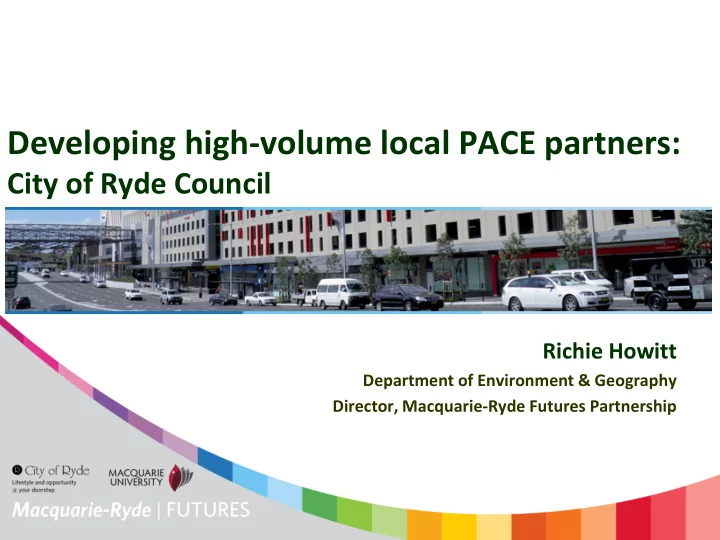

Developing high-volume local PACE partners: City of Ryde Council Richie Howitt Department of Environment & Geography Director, Macquarie-Ryde Futures Partnership
Developing high-volume local PACE partners • Local partners able to accommodate large student numbers across a wide range of fields will be important in developing PACE as an element of the mainstream curriculum. • Building and managing relationships with such partners, however, presents challenges. • Local Government undertakes a wide range of activities and programs in which student participation may be appropriate. • This project will evaluate the initial participation activities with City of Ryde Council to identify issues that affect the m rigorously and pilot implementation of responses to lessons from initial evaluation.
Macquarie-Ryde Futures Partnership MOU signed in December 2011 envisages a partnership that addresses: – Research – Planning – Student-based engagement across the undergraduate and graduate coursework in City of Ryde programs and projects through the Participation and Community Engagement program (PACE) – Funding and in-kind contributions from each partner – Intellectual property issues arising from research – Publications.
Current projects Current projects within the MRFP include: – Community Engagement research (FBE) – Waste-to-Energy research (FoS, Macquarie Property) – Transport research (FoS with FBE, FoA, FHS, Macquarie Property) – Environmental projects (FoS, FoA, FBE) – Workforce planning (FBE, FoS) – Student projects in Geography, Sociology, Computing, Planning, Public Relations, Marketing, Psychology, Health and elsewhere
Emerging areas Topics under development include: – Student accommodation and Homestay programs – Planning and development issues in Macquarie Park – Volunteer connections in Ryde LGA – Regular seminars at Council on research – Community development – Financial modelling and governance
The PACE relationship The diversity of possible participation activities with Council (see matrix below) has led to some confusion. Just what is best pursued within a PACE relationship, and what is better suited to other sorts of programs including commissioned research, long-term research programs, HDR student research (including Council staff undertaking HDR studies) and work by non-PACE students in undergraduate and graduate programs.
Placements Recurrent Generic Projects Customised Projects Projects PACE program activities Non-PACE student activities Non-PACE student activities Research activities (PhD projects) Research activities not involving students A preliminary matrix of PACE and non-PACE activities with City of Ryde
What are the pitfalls? Early discussions indicate a range of possible pitfalls in managing the PACE engagement with a high-volume local partner such as City of Ryde: – Student skills and commitment (especially in internships and placements) – Supervision capacity (small Council work teams are already heavily loaded and sometimes not resourced to take on ‘supervision’) – Scheduling (Council work flow management is inconsistent with University unit and program schedules) – Repetition of some tasks to administer student participation (Councils might be used to bureaucracy, but prefer streamlined processes) – Scope and project definition (defining scope and avoiding scope creep is important in any student-based activity) – Matching students to fit tasks and settings – Securing longitudinal commitment
Goals of the PACE DG Project The project will interview students and industry and academic supervisors and review activity development, student placement, supervision and reporting processes, contact and activity management, and the effectiveness of activities. Specifically, the project will: – Evaluate the effectiveness of the developing relationship between PACE and City of Ryde. – Document and review outcomes of communications about PACE with Council. – Review the experience of students, City of Ryde staff and University staff involved in PACE projects with City of Ryde. – Identify lessons relevant to the PACE relationship with City of Ryde and development of relationships with other local government partners, and other high-volume local PACE partners. – Coordinate with other related PACE DG projects to avoid duplication.
PACE DG Project Schedule Review of all 2012 PACE activities in City of Ryde (September-October) Interview student, Council and University staff involved in PACE project activities in 2012 (October-November) Coordination meetings with Human Sciences project (previous paper by TWS and JH) (October and November) Report to PACE and MRFP review process (December)
Recommend
More recommend